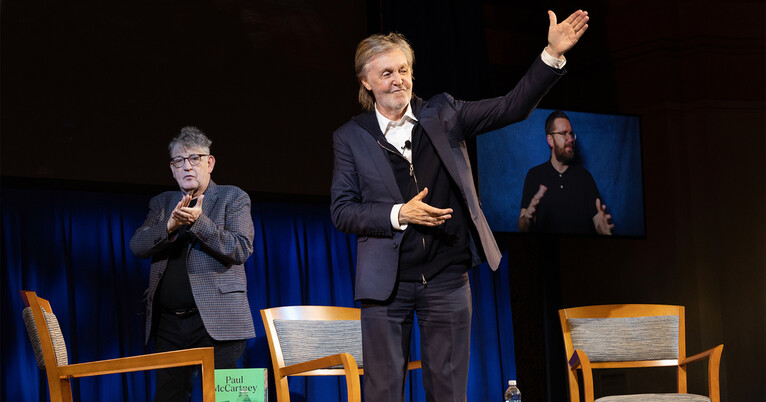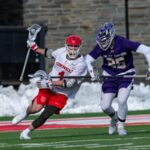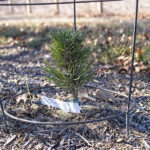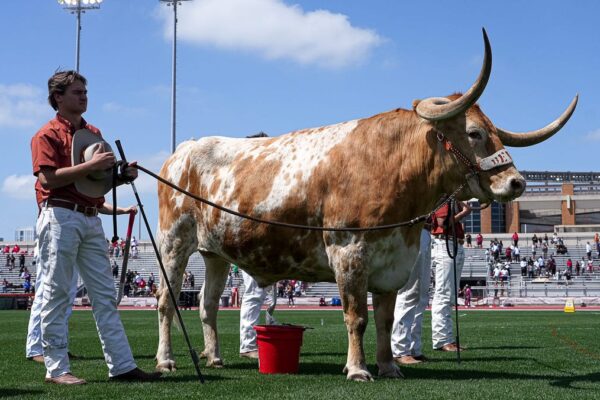Paul McCartney takes center stage at Yale
Paul McCartney long ago made himself a household name through his songs. On Thursday he came to Yale to talk about where they came from.
In a wide-ranging and informal conversation about his bestselling book “The Lyrics: 1956 to the Present,” the former Beatle — who received an honorary degree from Yale in 2008 — explored the craft of songwriting and some of the history behind his music with the book’s editor, Pulitzer Prize-winning poet Paul Muldoon. Langdon Hammer of Yale’s English department served as moderator.
Over 90 minutes at Woolsey Hall, the trio discussed the influence of McCartney’s close-knit family and his upbringing in the lively port city of Liverpool, the inspiration he still draws from American Rock ‘n’ Roll pioneers like Little Richard and Chuck Berry, and his creative partnership with John Lennon.
As they probed aspects of some of McCartney’s best-known songs — including “Eleanor Rigby,” “Yesterday,” and “Hey Jude” — the legendary musician offered glimpses into his methods and the marvels of creative work.
Sometimes, he said, songs emerge spontaneously, as when the he first heard the melody to “Yesterday” in his sleep. After confirming it wasn’t an old tune his father had taught him, he began drafting lyrics for what became a Beatles classic.
“It is magical when that happens — the more you think about it, the more magical it becomes,” McCartney told the capacity crowd, a mix of members of the Yale community and the general public, including two of his own grandchildren. “People say, ‘Do you believe in magic?’ And I say, well I have to!”
Yale President Peter Salovey opened the evening, hosted by Yale Schwarzman Center, the university’s hub for student life and the arts, recalled his own early boyhood love for The Beatles. When McCartney took the stage a few moments later, an adoring audience representing several generations greeted him with a standing ovation.
McCartney and Muldoon discussed the origins of “The Lyrics” and how they went about shaping the book, in which McCartney reflects on his life and art through the lens of 154 songs written throughout his career, from his earliest compositions as a teenage fan of Elvis Presley in Liverpool through his years with The Beatles, Wings, and beyond.
In addition to offering the definitive lyrics to these songs, which are arranged alphabetically rather than chronologically to provide a “kaleidoscopic” account, the book offers vivid and personal details on the circumstances under which they were created, and the influences and inspirations behind his art.
At Woolsey Hall Thursday evening, he brought many of these stories to life, expressing gratitude for the loving and musical atmosphere in his childhood home, reflecting on some of his musical influences, and recalling his close and prolific partnership with Lennon.
In discussing their songwriting chemistry, McCartney described their habit of facing each other, guitars in hand, McCartney playing left-handed, Lennon right-handed, almost mirror images. They’d work for two or three hours, and nearly always emerge with a new song. Together they wrote nearly 300 of them.
“Not bad for a couple of Liverpool lads,” he said.
Speaking of his approach to performing, McCartney addressed the power, excitement, and value he has found in emulating other musicians. As a young singer, for instance, he sometimes sought to channel the energy of Little Richard or the delivery of Ray Charles by imitating them. But when he’d listen to the recording afterward, he’d realize he didn’t sound like them — but had instead achieved a voice distinctly his own. In imitation, he’d found liberation, and created something new.
Hammer, the moderator, said that in one of his favorite sentences in “The Lyrics” McCartney describes the work of a songwriter as akin to exchanging a baton in a relay — you hold it for a while and then you pass it on to someone else.
“I love the thought that people are listening to what you do, are digesting it, are finding meanings in it, and then taking they take the baton and do their own thing, whatever it is,” McCartney told the audience. “But you’ve inspired them. It’s one of the best things.”
The Schwarzman Center event was McCartney’s first public conversation in the United States about the “The Lyrics.”
“The evening was an honor, a joy and a thrill. The collective love of Paul McCartney was palpable,” said Rachel Fine, the Schwarzman Center’s executive director. “The energy and enthusiasm were evident across multiple generations of dedicated fans. Not one person in the hall will ever forget this memorable evening.”













